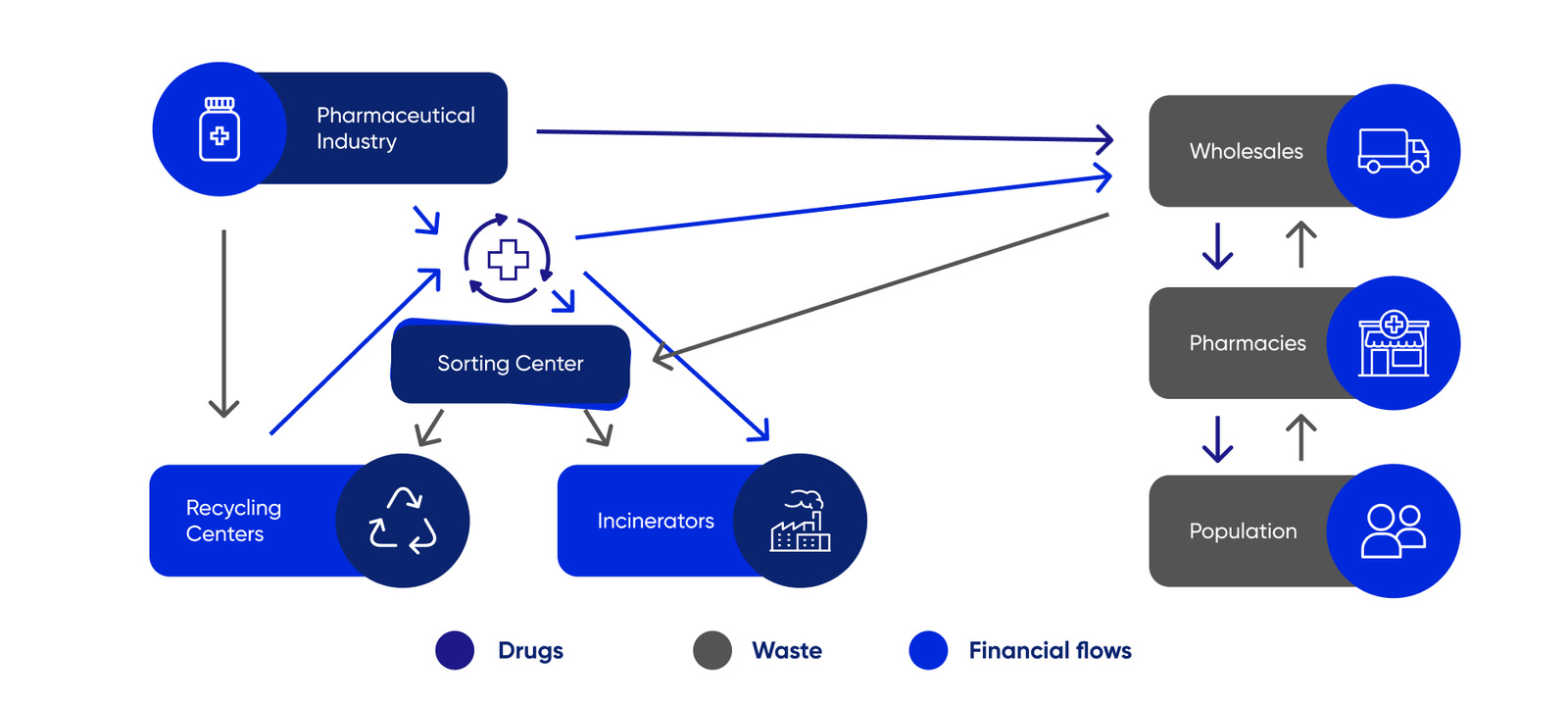In the sophisticated world of drugs, where vials of hope span countries, there is a parallel journey—quieter but equally important. This is the area of pharmaceutical reverse logistics, where outdated medications, damaged supplies, and excess inventories make their way back. In this story, we untangle the regulatory threads that run through this complicated process, delving into compliance, safety, and sustainability.
Understanding Reverse Logistics
Consider a busy pharmaceutical warehouse, which serves as the supply chain’s heartbeat. Here, the return journey begins. Expired medications, damaged packaging, and overstocked merchandise come together in search of a new purpose. But this is no ordinary expedition; it is fraught with legal, environmental, and ethical implications.

1. Regulatory Landscape
Challenge: Navigating a worldwide patchwork of legislation.
Solution: Pharmaceutical companies must align their procedures with WHO, FDA, and EMA guidelines. These bodies establish rules for handling returns, recalls, and destruction.
2. Ensuring Product Integrity
Challenge: Ensure the safety and efficacy of returning medications.
Solution: Thorough inspection, temperature monitoring, and tamper-evident packaging ensure product integrity. Emerging technologies, such as blockchain, provide end-to-end traceability.
The Twists and Turns of Compliance Challenges in Pharmaceutical Reverse Logistics

Let’s delve into the twists and turns of compliance challenges in pharmaceutical reverse logistics:
1. Serialization and traceability
Challenge: Tracing a drug’s origin and route.
Solution: Serialization codes on packaging allow for smooth tracking. However, global standardization remains elusive. Each vial and blister pack has a unique digital fingerprint—a code that reveals its history. But this whisper reverberates beyond borders, languages, and systems. The European Medicines Agency (EMA) hums a harmonization tune, encouraging nations to dance together. However, certain processes get lost in translation. The barcode in Beijing may not be compatible with the QR code in New York. So the dance continues—a tango of data and a cha-cha of compliance.
2. Controlled Substances
Challenge: Handling opioids, psychotropics, and other regulated substances.
Solution: Strict compliance with The Controlled Substances Act (CSA) assures appropriate disposal and prevents diversion. Consider a room lined with painkillers, sedatives, and stimulants. Their potency whispers secrets, and their mere existence is a fragile balance. The DEA maintains an unwavering gaze. Destruction procedures are predetermined: witness, document, and incinerate. But what about the pharmacist who hesitates? The nurse who inquires? The regulated substance, once a lifeline, has become a liability. Compliance is a tightrope, whereas diversion is an abyss.
These are the curves in the road and the tiny print in the script. Remember that every regulation tells a story about safety, ethics, and accountability. The vials return; their labels have faded but their functions are unchanged. So we dance between conformity and compassion, regulations and redemption. 🌟
The Crossroads: Sustainability and Environmental Impact of Pharmaceutical Reverse Logistics
Let’s explore the crossroads where sustainability and environmental impact intersect in the realm of pharmaceutical reverse logistics:
1. Reducing Waste: A Sustainable Journey
Companies set out on a mission to eliminate waste generated throughout the supply chain by merging reverse logistics and sustainability. Consider the ripple effect: fewer abandoned vials, less packing material, and reduced inefficiencies. The carbon footprint decreases, and the world breathes a bit easier. But this is more than simply altruism; it’s a wise business decision. Waste reduction leads to cost reduction. Recycling and reuse become the preferred currencies, and the bottom line responds positively.
2. The Dance of Responsibility: Social and Economic Impact
a. Social Responsibility

At the heart of reverse logistics is a social compact. The returned vials, which were once life-sustaining elixirs, now serve a different function. Repair, renovation, and repackaging all suggest second chances. But, beyond the whispers, there is a symphony of impact. Communities benefit from job creation, with specialists repairing vials and craftsmen altering packaging. The ripple spreads to clinics, shelters, and schools. Social responsibility grows, and the dance continues.
b. Economic Efficiency
Reverse logistics activities, such as untangling tangled supply chains, reveal hidden treasures; salvaged materials find new life, lowering procurement costs; repurposed packaging hints at cost-effectiveness; and the warehouse, once a graveyard of discarded goods, transforms into an asset hub. Profitability aligns with purpose, and the economic tango accelerates.
3. The Circular Symphony: Environmental Stewardship
a. Waste Management
The orchestra starts with rubbish. Pharmaceutical reverse logistics organizes take-back programs, recycling efforts, and waste-to-energy solutions. The wasted vials, like notes on a score, achieve harmony. They no longer haunt landfills; instead, they fuel incinerators or transform into electricity. Sustainability is not a solitary act; it is a symphony of choices, with the circular economy calling us to dance.
b. green packaging
The encore is all about packing. Lightweight and recyclable materials take center stage. Cardboard boxes that were once silent witnesses now pirouette beautifully. Eco-friendly designs—minimalist and efficient—reduce the environmental footprint. Applause comes from the globe itself, whispering, “Thank you for the encore.” And we bow, understanding that each sustainable step deserves standing applause.
As the curtain falls, we see a world in which sustainability and reverse logistics go hand in hand. The vials return not as waste but as threads in a tapestry—a story of balance, accountability, and hope. 🌿🌎
Conclusion
Pharmaceutical reverse logistics is more than just logistics; it’s a moral responsibility. As we navigate this convoluted chain, keep in mind that each returning vial represents hope, healing, and responsibility. We can walk this labyrinth with purpose and compassion if we embrace regulatory frameworks, prioritize safety, and promote sustainability.
In the twilight of our story, the warehouse doors swing wide, exposing a new dawn—a world where restrictions coexist with empathy, and every returned shipment whispers, “Handle with care; lives depend on it.” . The future is bright if we choose to walk hand-in-hand with compassion.

